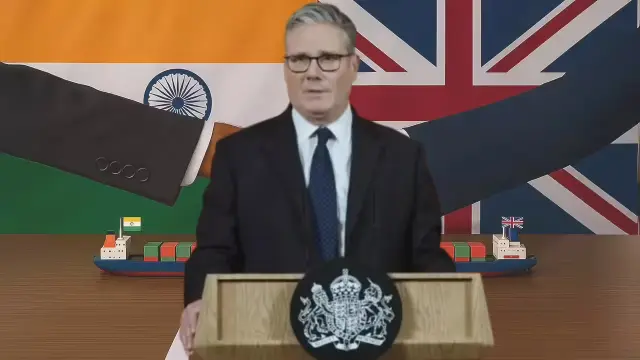October 8, 2025
British Prime Minister Keir Starmer begins a two‐day India visit with over 100 UK business and academic leaders to promote the recently signed UK-India free trade agreement aimed at boosting exports and investment.

British Prime Minister Keir Starmer has commenced a two-day visit to India, aiming to deepen economic and business relations following the UK-India Free Trade Agreement signed in July 2025. Accompanied by a delegation of over 100 leaders from the business, cultural, and academic sectors—including representatives from BP, Rolls-Royce, BT, Diageo, and others—Starmer’s trip is intended to translate the trade pact into real economic opportunity. Business Recorder+3Reuters+3Business Standard+3
This landmark FTA, the largest UK bilateral trade pact since Brexit, stipulates cuts in tariffs on goods such as textiles, whisky, and cars, and allows greater market access for companies on both sides. The agreement, negotiated over three years and finalized in May, is projected to increase bilateral trade by £25.5 billion (≈ US$34 billion) by 2040. Reuters+2Business Standard+2
Starmer pointed out that India is forecast to become the third-largest global economy by 2028, and emphasized that the agreement is more than just symbolic—it’s “a launchpad for growth.” The trip also includes infrastructure commitments, flight route expansions, and commitments from UK companies to explore opportunities in the Indian market. Reuters+2CNA+2
One of the concrete outcomes of the visit will be increased air connectivity. British Airways will add a third daily flight between London Heathrow and Delhi in 2026, and Manchester Airport will inaugurate a new Delhi route operated by Indian carrier IndiGo. Reuters+2Business Standard+2
While the trade deal has generated significant optimism, Starmer made it clear that the agreement does not include visa reforms for Indian workers or professionals. Reuters+2Dawn+2 This separation of trade and migration policies underscores the delicate balance the UK government is seeking as it leverages trade expansion while maintaining strict immigration stance. Reuters
Discussions between Starmer and Indian Prime Minister Narendra Modi will focus not only on trade implementation but on future cooperation in sectors like renewable energy, technology, and education. Both governments aim to ratify and fully implement the deal within the next year. Reuters+2Business Standard+2
Analysts believe this visit is critical for Starmer, given economic headwinds at home and a need to signal international engagement. With growth among his top priorities, he is seeking to demonstrate that post-Brexit trade policy can yield decisive gains while reinforcing the UK’s global role.